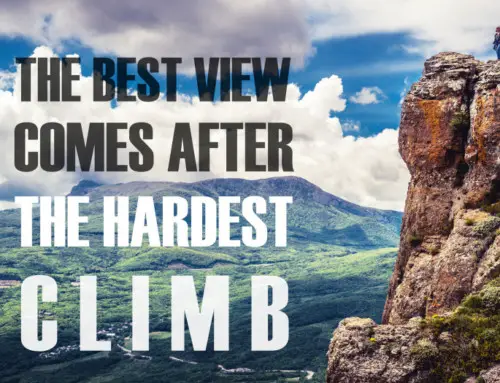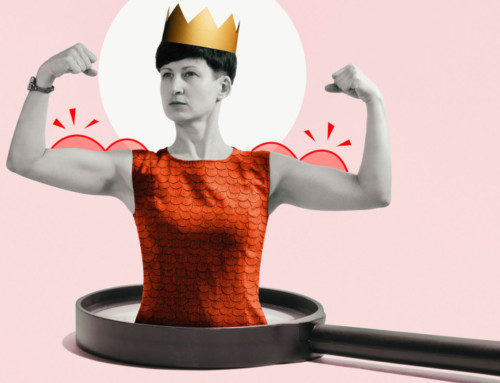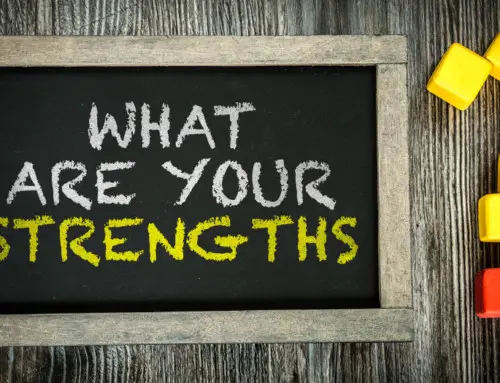Do you know the answer to what are your personal strengths? I’m guessing your list of strengths is a lot longer than you imagine. Let’s find your TOP 3 STRENGTHS together below.
What are your Personal Strengths?
The question may seem harder than it really is. The first step in understanding your strengths is to look to the past. What areas do you excel at? What are your past achievements? Coming up with your list of strengths is not only important for answering job interview questions.
Knowing your strengths allows you to build on them and grow stronger in the areas you excel at.
(Side note: Want flexibility at your new job? Check out The 4-Hour Workweek)
Personal Strength Defined
Personal strengths are traits that you’re naturally good at and excel in. These can also be skills that you’ve acquired over time and continue to build on. Your personal strengths can help you create the life of your dreams.
Some examples of personal strengths include creativity, communication, empathy, discipline, problem-solving skills, the ability to work hard and stay focused, the ability to learn quickly and adapt, self-motivation, the ability to lead others, organization skills, and excellent time management.
Job Interviews – Top 5 tips when highlighting your Personal Strengths and Weaknesses

1. Be honest and open about your personal strengths and weaknesses:
When discussing your personal strengths, it is important to be honest and straightforward about what you do well and what areas you need improvement in. This shows employers that you have a realistic understanding of your own strengths and weaknesses and are willing to work on any areas that need improvement.
2. Highlight strengths that are relevant to the job:
When discussing your personal strengths, focus on qualities that are relevant to the job you are interviewing for. For example, if you are applying for a customer service position, it is important to highlight your strong communication skills and ability to calmly de-escalate customer issues.
3. Acknowledge weaknesses, but demonstrate how you address them:
When discussing your personal weaknesses, it is important to acknowledge them and demonstrate how you have taken steps to address them. For example, if you have difficulty managing time, demonstrate how you have implemented organizational systems to help keep yourself on track.
4. Focus on the positive:
It is important to remember that the interview process is not a time for self-criticism. Even if you have weaknesses, focus on how you have taken steps to address them and how your personal strengths can help you to succeed in the job.
5. End on a positive note:
No matter what job you are interviewing for, it is important to end on a positive note by highlighting your enthusiasm and interest in the job. This will leave a lasting impression and can give you an edge. Employers want to hire people who are passionate about the job and willing to go the extra mile. By highlighting your strengths and demonstrating how you can use them to benefit the job, you will be sure to make a positive impression. Good luck!
List of Strengths and Weaknesses you can use in a job interview
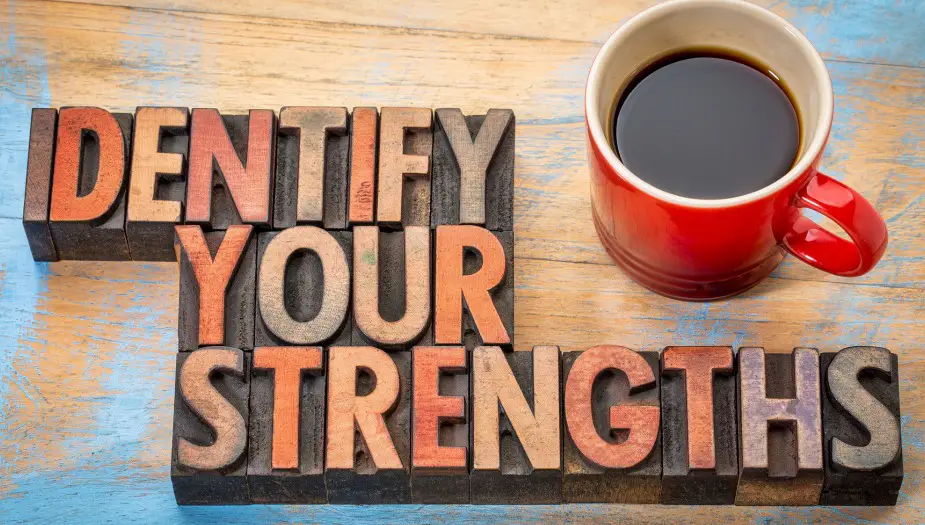
Below is a list of strengths. The first step is to identify your TOP 3 STRENGTHS. Doing this for both your strengths and weaknesses is important. Knowing your lists before an interview will allow you to mention them throughout the conversation.
Personal Strengths Examples
These are personality traits that make you unique and a desirable candidate in a job interview. Your personal skills tell employers why they should hire you. They are used to answer the question “Tell me something about yourself”. Usually this is one of the first questions in an interview. Examples of personal skills are below:
- Ambitious
- Authentic
- Caring
- Creative
- Dedicated
- Enthusiastic
- Flexible
- Honest
- Integrity
- Logical
- Motivated
- Optimistic
- Open Minded
- Persistent
- Responsible
- Self Controlled
- Trustworthy
- Versatile
Transferable Skills — These are skills you develop through your past experiences. Transferable skills are attributes employers are looking for in good candidates. They are skills that will help your future employer and should be highlighted. Transferable skills include:
- Team Player
- Great Communication
- Leadership Experience
- Writing Skills
- Follows Directions Well
- Analytical
- Computer Skills
- Time Management
- Client Relations
- Problem Solving
- Motivational
- Effective Listener
- Negotiation Skills
- Excellent Presenter
- Well Organized
- Bi-Lingual
- Great Planner
- Able to Delegate
- Detail Oriented
- Interpersonal Skills
Knowledge-Based Skills — These are acquired strengths you gain through past work and school experiences. These are usually career specific and require training of some sort. The skills vary across industries are more straight forward. Knowledge-Based Skills include:
- Accounting
- Marketing
- Finance
- Managerial
- Drafting/Design
- Artistic
- Medicine
- Aerospace
- Engineering
- Web Design
- Carpentry
- Product Development
- Startup Knowledge
- Legal
- Teaching
- Mathematics
- Photography
- Computer Science
- Biology
- Architecture
- Civil Engineering
- Nursing
- Philosophy
- Politics
- Social Media
- Contract Services
- Product Design
Job interviews – Personal and Professional Strengths

Personal and professional strengths are important to discuss during a job interview. It is important to be able to articulate the skills, qualities, and accomplishments that make you unique and an ideal candidate for the position.
Job interviews can be scary, but it is also a great place to showcase your strengths and weaknesses to meet the job description.
Personality strengths are attributes such as being a team player, having strong communication skills, being organized, or having a strong work ethic. These personality strengths reflect your personality and character and should be tailored to the position you are applying for.
Examples of The Job interview strengths questions
What personal strengths do you bring to this position?
I bring a wide variety of personal strengths to this position. I am highly organized and detail-oriented, which allows me to efficiently manage multiple tasks and ensure that all deadlines are met.
I am also a creative problem solver, which enables me to think outside the box when it comes to solving issues and coming up with innovative solutions. Additionally, I have excellent communication skills and am a confident public speaker, which makes me effective at engaging with a range of co-workers.
How have your past experiences helped you develop important professional strengths?
My past experiences have helped me develop important professional strengths. In my previous roles, I was exposed to a variety of different tasks and responsibilities that allowed me to develop my analytical skills, which I am now able to apply in this position.
Additionally, due to the collaborative environment of these roles, I was able to hone my communication and team-working skills, which help me build strong relationships with co-workers. My past experiences have also given me a great appreciation of the value of meeting deadlines and staying organized, which are important skills to have in any professional setting.
What strengths set you apart from other candidates in this field?
My personal strengths that set me apart from other candidates in this field include my creative problem-solving skills and my ability to think outside the box. I have a knack for finding innovative solutions to challenging problems, which can be an asset in any professional setting.
Additionally, my excellent communication and public speaking skills allow me to effectively engage with my co-workers.
How have you been successful in working with other team members?
I have been successful in working with other team members by utilizing my communication skills and ability to build strong relationships. I am confident in expressing my ideas and opinions to my colleagues, which helps build a collaborative working environment.
Additionally, I am an attentive listener and take the time to understand everyone’s perspectives, which allows us to work together effectively.
What are Your Personal Weaknesses?

Personal weaknesses are areas where a person may lack the skills, knowledge or experience needed to achieve their desired goals. Having self awareness of some of your weaknesses can help you build positive relationships and make a positive impact on your life.
These weaknesses can be addressed through self-improvement strategies like setting achievable goals, tracking progress, studying or taking classes to learn new skills and consistently affirming yourself. Additionally, it can be beneficial to receive feedback from trusted people in your life and to use that feedback to create an action plan for improvement.
List of Weaknesses: Personal Weakness Defined
1. Lack of organizational skills
2. Poor time management
3. Low self-esteem
4. Procrastination
5. Short temper
6. Poor communication skills
7. Inability to prioritize tasks
8. Struggling with decision making
9. Not being able to take criticism constructively
10. Difficulty accepting change
Examples of The Job interview weaknesses questions
What do you consider to be your biggest weakness?
My biggest weakness is that I can sometimes be too self-critical and be hard on myself. I tend to focus on my flaws rather than my strengths, which can be a barrier to personal growth. I am working on this by trying to focus more on the positives and being kinder to myself.
I have also developed strategies to help me reframe negative thoughts in a more constructive and positive way.
How do you handle working in a team environment when one of your team members is not pulling their weight?
I believe in open, honest communication and working together to find solutions. I would first try to understand why this team member is not pulling their weight and work with them to identify any potential barriers that can be removed. I would then provide support and guidance to help them become an active contributor.
What is a weakness you have overcome?
I have always been naturally shy and had difficulty speaking up in group settings. Through practice, I have developed more confidence in my communication skills. I have also become a better listener, allowing me to better understand the perspectives of others and build stronger relationships. As a result, I am now more comfortable speaking up and sharing my ideas in team environments.
Top 3 Strengths Conclusion
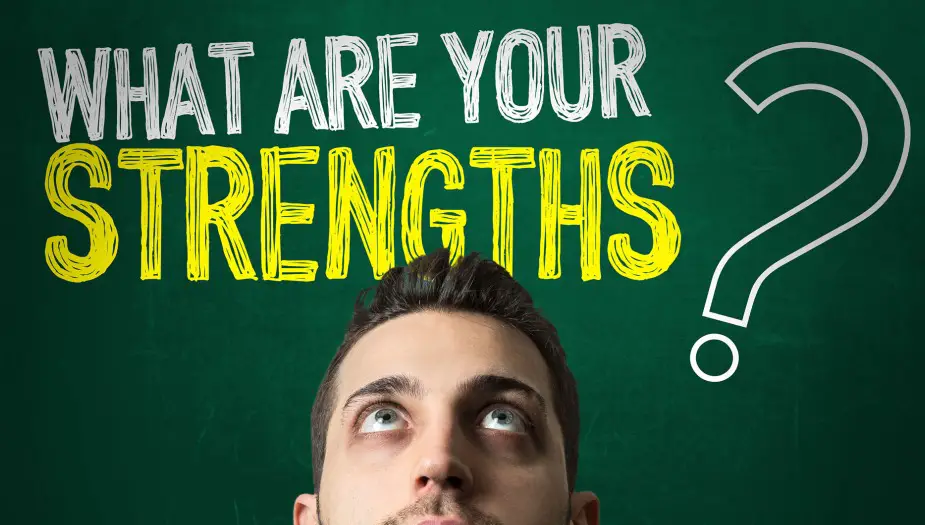
Finding your top 3 strengths could include various combinations of personal, transferable and knowledge-based skills. There are two different ways to choose your top 3 strengths when going into an interview.
The first is to select your strengths without a specific job in mind.
The 3 you choose are most likely your bread and butter. They are strengths you have no matter what the job environment is. Keep these in mind when you are reading over job descriptions and choosing what skills you will highlight in job interviews.
The second method involves catering your answer for the specific job. You can find a complete guide to My Strengths and Weaknesses here. We also have a List of Weaknesses post that you may find helpful.
Question:
What are your strengths? Comment below with a list of 3 strengths you poses that may or may not be in the lists above. This will help others see different possibilities.

